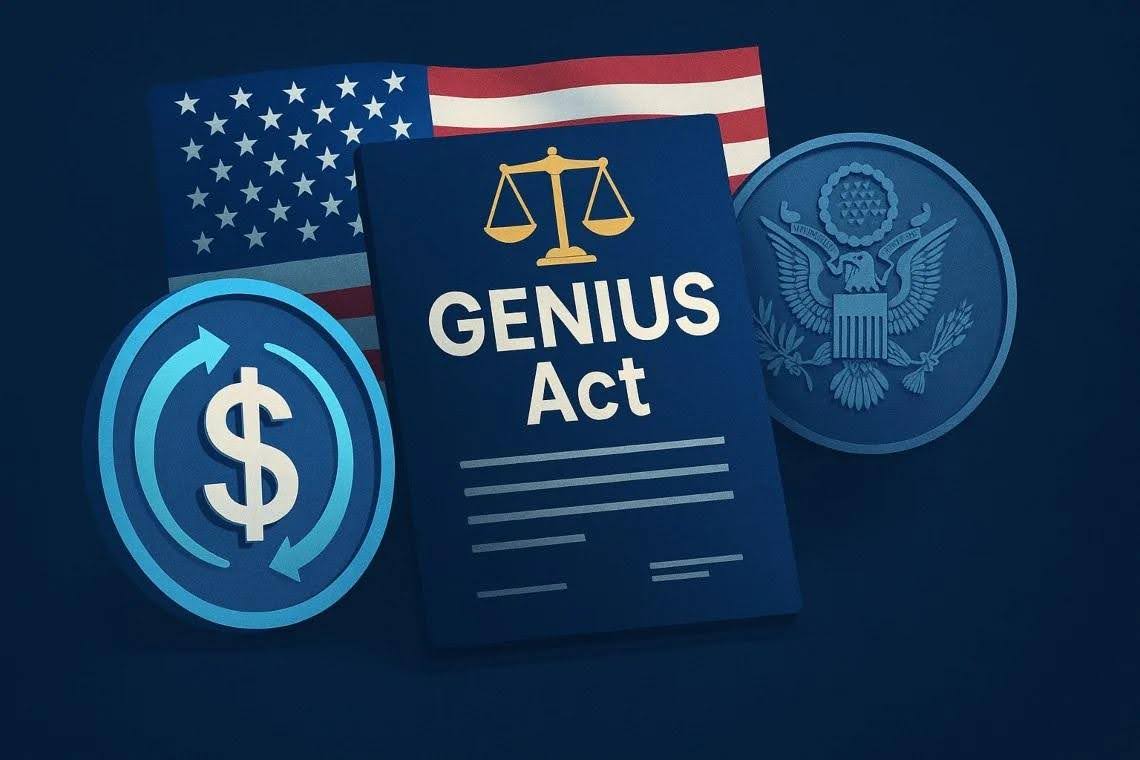GENIUS Act and the Future of Banking: How Stablecoins and Blockchain Are Redefining Finance

As blockchain and cryptocurrency technology continue to reshape the financial industry, the recent introduction of the GENIUS Act has further accelerated this transformation. This legislation allows apps to hold U.S. dollars on behalf of users in the form of stablecoins—effectively giving apps bank-like capabilities. But this shift isn’t just a legal development; it reflects a deeper movement toward decentralized finance (DeFi) and a reimagined financial ecosystem.
From Centralized Banking to Decentralized Finance
Traditionally, banks generated revenue by holding deposits and earning interest. With the rise of blockchain, however, individuals can now store and transfer value without intermediaries. This shift enhances transparency, improves efficiency, and enables financial autonomy on a global scale.
The GENIUS Act underscores this evolution by legally empowering fintech platforms to hold and manage digital dollars through stablecoins. As a result, we may see a gradual decline in reliance on legacy banking infrastructure in favor of low-cost, decentralized platforms that offer the same—if not better—services directly through apps.
Stablecoins in Fintech: Financial Revolution or Speculative Risk?
Stablecoins like USDC and USDT are already central to crypto’s usability, offering the price stability of fiat with the advantages of blockchain. Under the GENIUS Act framework, their adoption is likely to become even more widespread.
Why Stablecoins Are Driving Financial Innovation:
- Stable Value: Pegged to fiat currencies, they enable reliable transactions.
- Frictionless Payments: Cross-border payments and transfers can be executed in seconds.
- In-App Integration: Platforms can incentivize users to deposit and spend within the app economy.
Yet, stablecoins are not without risk. Regulatory uncertainty, reserve transparency, and systemic events—such as USDC’s depegging following a bank collapse—have exposed vulnerabilities in current models. To become a universally trusted financial tool, stablecoins must overcome these regulatory and risk-management hurdles.

How Blockchain Is Reshaping Traditional Banking Models
Banks are no longer just physical institutions with vaults and tellers. The fusion of blockchain with financial services is streamlining once-cumbersome processes. From settlement systems to payment infrastructure, everything is being rebuilt for speed and transparency.
Take Stripe, for instance—a fintech leader integrating stablecoin payments to enable near-instant transactions with lower fees. These innovations don’t just save time and money; they also democratize access to financial tools for underserved markets.
I believe the future lies in collaboration between fintech startups and traditional banks. Fintechs bring speed, flexibility, and innovation, while banks offer regulatory compliance and trust. Together, they’re reshaping financial access through decentralized applications (dApps) that deliver secure, cost-efficient services directly to users.
Fintech Startups Embrace the GENIUS Act: A New Era of Financial Empowerment
With the GENIUS Act in place, fintech startups have a rare opportunity to leapfrog traditional finance. Companies like SoFi and LendingClub are already blurring the lines between bank and tech company, offering loans and savings products while bypassing many of the inefficiencies of traditional systems.
In the age of stablecoins and DeFi, these startups may no longer need to rely on the capital pools of large banks. Instead, they can offer decentralized financial services directly to users, enabling peer-to-peer lending, in-app payments, and smart contract-enabled services that are more scalable and inclusive.
The challenge, of course, lies in regulatory balance. As agencies refine rules around digital assets, fintechs will need to find the right middle ground between compliance and innovation to thrive in a fast-moving space.

Decentralized Finance and the Road Ahead for Compliance
The future of financial services is undeniably decentralized—but that doesn’t mean banks are obsolete. Instead, the coming years will be defined by a hybrid model, where fintech and banks collaborate within a regulatory framework powered by blockchain infrastructure.
Yet compliance will remain one of the most critical challenges. As more platforms enable crypto-based services, maintaining user protection, global standards, and responsible innovation will be essential. The infrastructure must evolve not just to facilitate transactions, but to support interoperability and international regulation.
In the GENIUS Act era, banking is being redefined—not eliminated. Apps are replacing bank branches. Stablecoins are replacing wire transfers. And blockchain is replacing outdated ledgers. What lies ahead is a financial system that is faster, fairer, and more inclusive—but only if it’s built with both decentralization and responsibility in mind.

The Financial Revolution Is Already Underway
We are standing at the edge of a transformative era in finance. The GENIUS Act is not just another regulatory update—it signals a paradigm shift toward a decentralized, app-driven financial future. Stablecoins, blockchain, and fintech innovation are making financial services more efficient, transparent, and global than ever before.
As this transformation unfolds, the traditional role of banks will continue to evolve. Whether they adapt and collaborate or resist and fall behind, one thing is clear: the future belongs to decentralized finance—and the innovators who embrace it.
If you're a founder, investor, or policymaker, now is the time to lean in. Because the future of finance is no longer coming—it's already here.
Cwallet: Your Gateway to a New Era of Crypto Finance
Cwallet is not just a crypto wallet; it's a comprehensive Web2.5 financial platform. We seamlessly integrate security, privacy, and convenience, laying the foundation for a transformative financial landscape. With Cwallet, you can securely hold, send, receive, swap, tip, and earn from over 60 blockchains and 1000+ cryptocurrencies — all within one powerful platform.
We aim to expand the rich applications of crypto. Our intuitive Telegram bot allows for effortless engagement in airdrops and fosters community connections through tipping and group management tools. Additionally, we offer $USDT earnings with a maximum APR of 10% and provide competitive loan services. We also offer the Cozy Card — your passport to global spending. This innovative card enables you to use your digital assets like cash, simplifying transactions worldwide and enhancing convenience through Apple Pay and Google Pay.
Furthermore, we provide additional toolkits, including HR bulk management system, mobile top-ups, gift cards, and more. With over 37 million users, Cwallet invites you to reimagine crypto. Stay cozy and step into the future of finance with us.
Official Link
Official Site: https://cwallet.com
Twitter: https://twitter.com/CwalletOfficial
Disclaimer: This content is for informational purposes only and is not investment advice. Please invest wisely and at your own risk.
